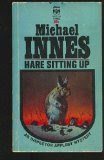
Michael Innes' 1959 novel
Hare Sitting Up feels oddly contemporary and queerly nostalgic at the same time.
It's contemporary because of the stunning immediacy of the opening chapter's six-way colloquy about nuclear and biological apocalypse. It's nostalgic because the fear of apocalypse seems so 1980s, if not positively Cold War. These days, our collective fears are less about the end of humanity than about wars that will never end.
Anyhow, here's a bit about
Innes, real name J.I.M. Stewart. Here's a bit about his protagonist,
Inspector John Appleby. Stewart was a Scottish-born academic who taught at Leeds, Adelaide and Belfast before settling in at Christ Church, Oxford.
This is the first novel I remember reading whose author was a don, and the donnishness comes through in two ways so far, both positive. Stewart taught English literature, and he took his title from
Women in Love: "(D)on't you find it a beautiful clean thought, a world empty of people, just uninterrupted grass and a hare sitting up?" That's an appropriate thought for musings upon the end of the world.
But the chat about apocalypse is the real tour de force. Five of the talkers are new Oxford graduates, full of the brashness of youth. The sixth is a schoolmaster: "Juniper found himself taking a deep breath. He hadn't much cared for the conference; he wasn't in very good spirits; he was fifty-two."
==================
I'm not sure academic mysteries are as much in favor as they once were, and I think they were always more an English than an American phenomenon (though
Amanda Cross wrote marvelously barbed academic mysteries set at a prestigious New York university). Still, I'll toss it over to you and ask
what's your favorite academic mystery?© Peter Rozovsky 2009Labels: academic mysteries, British crime fiction, England, J.I.M. Stewart, Michael Innes
 A blurb from the Times Literary Supplement included with my edition of Hare Sitting Up calls author Michael Innes "the acknowledged grand master of that civilized entertainment, the donnish detective story."
A blurb from the Times Literary Supplement included with my edition of Hare Sitting Up calls author Michael Innes "the acknowledged grand master of that civilized entertainment, the donnish detective story."





